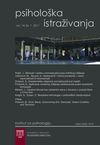Počinioci krađa, počinioci razbojništva i neosuđivana populacija: razlike u amoralnosti i socioekonomskim
karakteristikama
Perpetrators of Thefts, Perpetrators of Robberies and Persons with no Criminal Record: the Differences in Amorality and Socio-Economic Characteristics
Author(s): Tatjana Vukosavljević GvozdenSubject(s): Psychology, Criminology, Socio-Economic Research
Published by: Филозофски факултет, Универзитет у Београду
Keywords: amorality; committing offences; socio-economic status;
Summary/Abstract: The purpose of this study is to examine the differences between convicts and persons with no criminal record, as well as between two groups of convicts ‒ the perpetrators of thefts and the perpetrators of robberies in terms of amorality and socio-economic characteristics. The sample comprised 100 male convicts (51 convicted of theft and 49 of robbery) and 100 males with no criminal record, matching the group of convicts in age. The subjects completed the AMRL 15 questionnaire and a socioeconomic characteristics questionnaire. The results of the descriptive discriminant analysis have indicated that almost all dimensions of amorality are more pronounced in the group of convicts, compared to persons with no criminal record, especially two dimensions within Amorality induced by impulsivity. Convicts are also characterized by economically disadvantaged families. On the other hand, persons convicted of theft are characterized by somewhat higher scores on two dimensions within the Amorality induced by brutality, while persons convicted of robbery have higher anthropological pessimism and more distinct problems with the primary family in terms of mentally ill parents. A general conclusion is that the three groups differ both with regard to amorality and to socio-economic characteristics.
Journal: Psihološka istraživanja
- Issue Year: 17/2014
- Issue No: 2
- Page Range: 105-120
- Page Count: 15
- Language: Serbian

